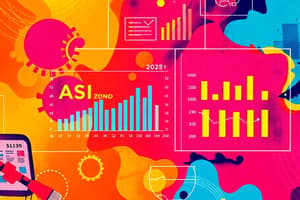Podcast
Questions and Answers
What is accounting?
What is accounting?
A systematic process of identifying, recording, measuring, classifying, verifying, summarizing, interpreting, and communicating financial information.
Define a system.
Define a system.
A group of two or more interrelated components or subsystems that serve a common purpose.
What is information?
What is information?
Processed form of data used for decision making.
Which of the following are components of a computer-based Information System? (Select all that apply)
Which of the following are components of a computer-based Information System? (Select all that apply)
What is an Accounting Information System?
What is an Accounting Information System?
What constitutes an Information System?
What constitutes an Information System?
What is system decomposition?
What is system decomposition?
What is the purpose of an information system designer?
What is the purpose of an information system designer?
All systems are manmade.
All systems are manmade.
What are stakeholders?
What are stakeholders?
Flashcards are hidden until you start studying
Study Notes
Accounting
- A systematic process involving identification, recording, measuring, classifying, verifying, summarizing, interpreting, and communicating financial information.
- Used to determine profit or loss over a period, and the value and nature of a firm's assets, liabilities, and owners' equity.
Information
- Processed data enabling decision making.
- Reduces uncertainty.
System
- An interconnected set of two or more components working together to achieve a goal.
- Each component may be a subsystem with a specific function, important to and supportive of the larger system.
Information System
- Combines hardware, software, infrastructure, and trained personnel organized to facilitate planning, control, coordination, and decision making within an organization.
Accounting Information System
- A framework a business utilizes to collect, store, manage, process, retrieve, and report both financial and non-financial data, enabling informed decision making.
The Information Environment
- Information is a vital resource for business organizations like raw materials, capital, and labor.
- All individuals within an organization, from operations to top management, require information to perform their tasks.
- Businesses are organized horizontally into various levels:
- Business operations (manufacturing, sales, distribution) form the base.
- Operations management controls day-to-day operations.
- Middle management handles short-term planning and coordination of activities to achieve organizational goals.
- Top management focuses on long-term planning and setting organizational objectives.
- Information flows horizontally, providing detailed information about business transactions to operational levels.
- Information flows vertically, transmitting summarized data about operations and activities to managers at all levels.
- External users are divided into two groups:
- Trading partners (customers, suppliers) exchange information related to sales, billing, purchases, and inventory.
- Stakeholders (internal or external entities) have a direct or indirect interest in the firm.
What is a System?
- Systems can be naturally occurring or artificial.
- Natural systems range from atoms (electrons, protons, neutrons) to the universe (galaxies, stars, planets).
- Artificial systems are manmade.
- A system comprises two or more interconnected components or subsystems with a shared purpose.
- System characteristics:
- Multiple Components: More than one part is necessary.
- Relatedness: Components are linked to achieve a common goal.
- System VS Subsystem: A subsystem within a larger system can also be considered a system itself when focused on.
- Purpose: Serving a purpose is the justification for the system's existence.
Components of a Computer-based Information System
- Data: Input the system utilizes to produce information.
- Hardware: Computer equipment for input, processing, and output.
- Software: Programs that instruct hardware to perform tasks.
- Databases: Organized collections of data.
- Telecommunications: Networks for data transmission.
- People: Individuals who operate and manage the system.
- Procedures: Instructions for using the system and its components.
Studying That Suits You
Use AI to generate personalized quizzes and flashcards to suit your learning preferences.



